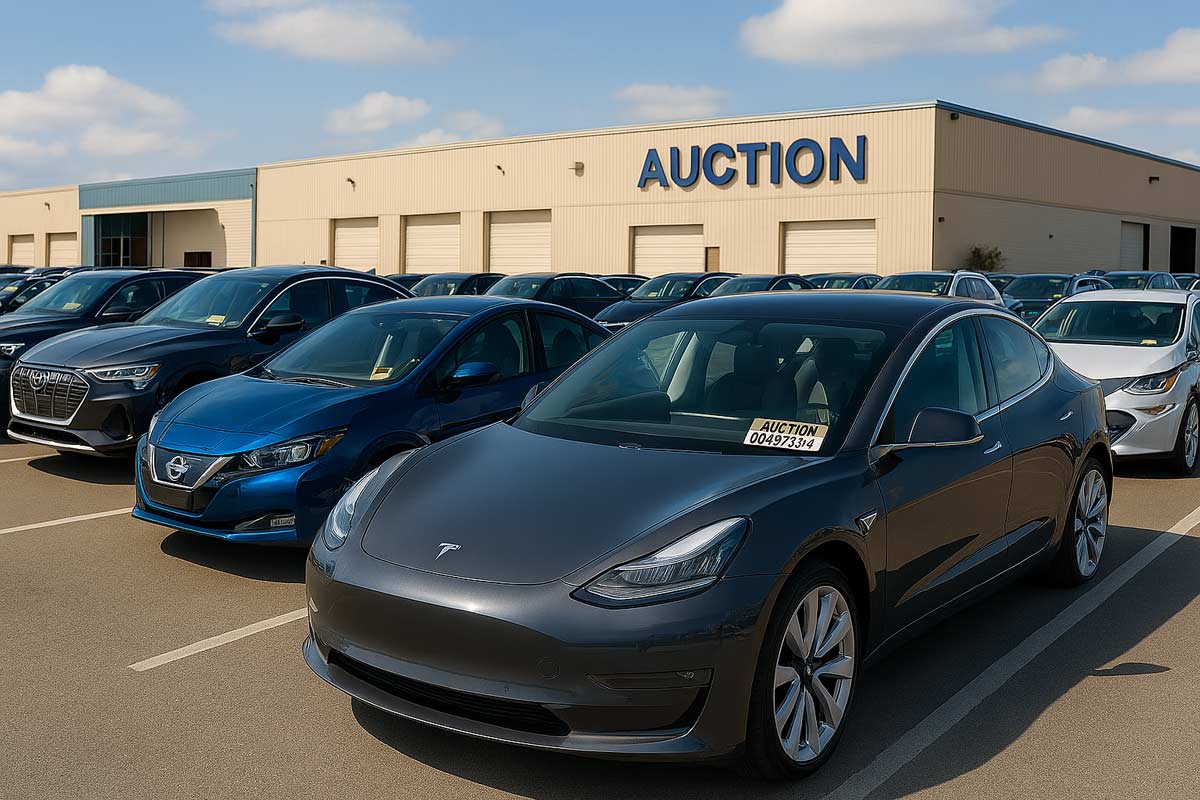 https://auction.ridesafely.com/images/2025/09/reserve-vs-no-reserve-auction-banner.jpg
865
1440
RideSafely
/images/2025/01/ridesafely-logo.svg
RideSafely2025-09-05 15:09:492025-09-08 11:21:31Auction Reserves vs. No-Reserve Auctions: The Complete Guide
https://auction.ridesafely.com/images/2025/09/reserve-vs-no-reserve-auction-banner.jpg
865
1440
RideSafely
/images/2025/01/ridesafely-logo.svg
RideSafely2025-09-05 15:09:492025-09-08 11:21:31Auction Reserves vs. No-Reserve Auctions: The Complete GuideElectric vehicles (EVs) are rapidly transforming the automotive industry, and savvy buyers — including car enthusiasts, exporters, and flippers — are taking advantage of the opportunity to purchase them at significantly reduced prices through car auctions. We’ve compiled the most compelling and strategic reasons to buy electric cars at auction, primarily through online salvage and wholesale platforms.
Unmatched Savings: Buy EVs Below Market Value
Electric cars at auction—especially at insurance auctions—are often sold for a fraction of their market value. Whether they’re listed as total loss, collision-damaged, slightly damaged, repossessed, off-lease, or from former rental fleets, these vehicles can be acquired for 30% to 70% less than retail prices. This price gap creates room for:
- Immediate equity upon purchase
- Higher ROI for resellers
- Lower total cost of ownership for private buyers
Many EVs found at auctions come from insurance companies or fleet liquidation, allowing access to near-new models with minor cosmetic issues or mechanical repairs.
Looking for more than just electric cars? Explore the Diverse Range of Vehicles Available at RideSafely including sedans, trucks, motorcycles, and more.
Total Loss Frequency: EVs Are More Likely to Be Written Off
Statistically, electric vehicles are declared total losses more frequently than ICE vehicles:
| Vehicle Type | Average Total Loss Frequency | Reason |
|---|---|---|
| ICE Vehicles | 9% | Cost-effective repairs |
| Electric Vehicles | 15-20% | Battery and sensor replacement costs |
This sharp increase in write-off rates is reshaping how insurers underwrite EV policies.
Wide Selection of Popular Electric Car Models
Auction platforms list a dynamic inventory of EVs, often featuring:
- Tesla Model 3, S, and Y
- Chevrolet Bolt EV
- Nissan Leaf
- Ford Mustang Mach-E
- Hyundai Ioniq and Kona Electric
- Kia EV6 and Niro EV
- BMW i3 and i4
This wide model diversity means buyers can find EVs that fit their lifestyle, performance preferences, and budget constraints—all in one place.
Access to Clean, Salvage, and Rebuilt Title EVs
Online auctions provide transparency into a vehicle’s title and history, offering the following advantages:
- Clean Title EVs – Ideal for immediate road use or resale.
- Salvage Title EVs – Best suited for rebuilding or parting out, depending on the title type.
- Rebuilt Title EVs – Repaired and inspected, ready to drive.
Each title category offers its strategic advantage, whether you’re a dealer, dismantler, mechanic, exporter, or DIY enthusiast. However, it is crucial to understand how vehicles are categorized and their reported condition.
For example, if you’re new to reading auction listings, check out Understanding Damage Codes: A Buyer’s Guide to Auto Auctions to make more informed and confident decisions.
However, it’s important to note that most clean title electric vehicles at auction may display a label such as “Auction Verification is NOT SPECIFIED,” indicating that critical details—such as “Run and Drive” status or confirmation that the vehicle starts—may be missing.
This doesn’t necessarily indicate a major issue. The auction facility often lacks the infrastructure to charge EVs before the sale. Usually, if an EV won’t start, the culprit is a drained 12-volt auxiliary battery, which is inexpensive and easy to replace. Knowing this can help buyers avoid missing out on viable EVs due to uncertainty around startup status. Conducting thorough research is essential.
Review the EV’s history reports on CARFAX and AutoCheck to comprehensively understand the vehicle’s background and most recent records.
Environmental and Economic Efficiency Combined
Buying an EV at auction reduces both your carbon footprint and your upfront costs. When you choose a salvage or pre-owned electric car:
- You extend the lifecycle of an existing vehicle
- You reduce demand for new production and battery mining
- You contribute to eco-conscious consumption
EVs also offer lower maintenance costs—no oil changes, fewer moving parts, and regenerative braking systems—making them a long-term economic win.
Online Access to Dealer-Only Auctions Without a License
Most dealer auctions are closed to the public, making it difficult for individual buyers to access dealer-only electric car auctions without a dealer license. However, platforms like RideSafely offer the following:
- Nationwide inventory access
- No membership fees
- Live bidding and pre-bid tools
- Vehicle condition reports
- Flat-rate buyer fees
- Post-purchase delivery to your home
This democratization of dealer inventory means individuals can now access EVs that were once reserved for licensed resellers. Even without a bid card or dealer license, you can still buy cars at auction — and enjoy exclusive savings with RideSafely.
High Voltage Tech at Wholesale Cost
EVs listed at auctions often include top-tier features at bargain prices, including:
- Autopilot and Driver Assist systems
- Premium infotainment with OTA updates
- Long-range lithium-ion batteries
- All-wheel drive electric powertrains
Instead of paying retail for cutting-edge EV technology, auction buyers can acquire advanced systems for pennies on the dollar.
Strategic Export Opportunities for Global Resellers
For international buyers, electric vehicles purchased at U.S.-based auctions can yield substantial profit margins when resold in EV-hungry countries. These platforms:
- Offer logistics support and vehicle documentation
- Allow bulk purchases for overseas dealerships
- Feature EVs in demand globally, especially Teslas
Electric vehicles with minor damage or cosmetic flaws are especially appealing to international markets, where repair labor is more affordable. Many buyers get their start flipping vehicles with only basic repairs. Salvage Car Auctions – Turn Profits While You Learn is a great resource if you’re looking to enter the resale market with minimal risk.
Tax Incentives and State-Level EV Benefits Still Apply
Depending on your location and vehicle title, purchasing an electric car—even at auction—may still qualify you for:
- Federal EV tax credits (if resold or new-use cases apply)
- State-level rebates or incentives
- Access to HOV lanes and reduced tolls
- Lower registration or inspection fees for zero-emission vehicles
Always confirm eligibility based on jurisdiction and vehicle condition.
How the EV Auction Process Works
| A[Browse EV Inventory] | B[Select Desired Electric Vehicle] |
|---|---|
| B –> | C[Place a Pre-Bid and Monitor the Live Auction as It Unfolds] |
| C –> | D[Highest Bid Wins at Auction Time] |
| D –> | E[Pay Final Price + Auction Fees] |
| E –> | F[Arrange Shipping or Pickup] |
| F –> | G[Vehicle Delivered to Buyer] |
This streamlined process allows you to go from search to EV ownership with transparency and speed—often in just a few days.
Before placing a bid, thoroughly researching the vehicle’s history is crucial. Most auction platforms provide access to detailed VIN reports through services like Carfax and AutoCheck. These reports reveal prior accidents, flood damage, title issues, odometer rollbacks, and service history.
By reviewing this data before bidding, you reduce the risk of unexpected repairs and make an informed investment—especially when purchasing salvage titles or as-is electric vehicles. This extra step can save thousands and boost long-term satisfaction with your EV purchase.
Ideal for DIY Projects, Flipping, or Daily Driving
Auction-bought EVs cater to:
- DIYers looking to rebuild and customize
- Flippers aiming for fast resale at markup
- Eco-conscious commuters wanting affordable transport
- Fleets needing multiple EVs for green transition
From minor repairs to plug-and-drive models, the versatility of auction EVs suits all buyer profiles.
EV auctions also attract value-seekers exploring repossessed vehicles. If you’re aiming to source high-demand models at low cost, Bank and Repo Auctions: Everything You Need to Know is a must-read to understand how lenders and institutions liquidate EVs and other vehicles fast.
Final Thoughts: Electrify Your Garage for Less
Electric vehicles represent the future—but that future is more affordable than ever when you shop at car auctions. With wholesale pricing, a massive selection, advanced features, and an eco-friendly footprint, there’s never been a smarter time to go electric.
EV Auction FAQs: What Buyers Need to Know
Are electric vehicles at auctions safe to buy?
Yes, many EVs listed at auctions are safe to buy, especially if they come with a clean or rebuilt title. Always review the vehicle history report, condition details, and auction photos carefully.
Why do some EVs not show a "Run and Drive" status?
Most EVs show “Auction Verification is NOT SPECIFIED” because the auction facility may lack the means to charge them. In many cases, a non-starting EV simply needs a charged or replaced 12-volt battery. However, it’s important to do thorough research—check the EV’s history reports on CARFAX and AutoCheck to review the vehicle’s history and latest records.
Can I access dealer-only electric car auctions without a license?
Yes. Platforms like RideSafely allow public buyers to access dealer-only auctions without requiring a dealer license, making it easy to bid on EVs from anywhere.
Do EVs at auction qualify for tax credits or rebates?
Some may qualify depending on your location, the vehicle’s title status, and whether you’re using it for personal or business purposes. Check with a tax professional or your state’s EV incentive program.
What are the most common EVs found at auction?
Popular models include the Tesla Model 3/Y, Chevrolet Bolt, Nissan Leaf, Hyundai Ioniq, Audi e-Tron and Ford Mustang Mach-E, among others.
Can I inspect or test the EV before bidding?
Most online auctions do not allow pre-purchase test drives. However, detailed photos, condition reports, and VIN checks are usually available. Some platforms offer inspection services at an additional cost.
What if the EV I win doesn’t start?
If the EV doesn’t start after purchase, check the 12-volt battery first. It’s a common issue and typically inexpensive to fix. Consider using a local EV-certified mechanic or repurposing the vehicle for parts resale if additional repairs are needed.





